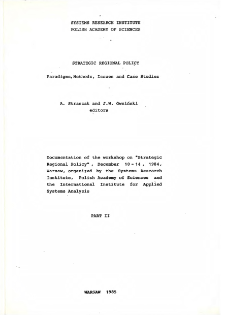- Search in all Repository
- Literature and maps
- Archeology
- Mills database
- Natural sciences
Advanced search
Advanced search
Advanced search
Advanced search
Advanced search

Object
Title: Strategic Regional Policy: Paradigms, methods, issues and case studies. Part II * Documentation of the workshop on "Strategic Regional Policy", December 10-14, 1984, Warsaw * Environment * An aproach to environmentally balanced regional development policy and the sustainability of the biosphere * Discussions
Subtitle:
Książka = Book ; KS/2/1985/R05P01
Publisher:
Instytut Badań Systemowych. Polska Akademia Nauk ; Systems Research Institute. Polish Academy of Sciences
Place of publishing:
Description:
[2], 396-421, 472-473 pages ; 21 cm ; Bibliography p. 419-421
Type of object:
Abstract:
Acceleralion of soientif!c and technological progress and of industrial, metropolitan and agricultural development leads to man's confrontation with nature. The influence of man on natura changes the equilibrium of its laws and established processes which leads to unpredictable conseąuences. Generally, these are negative, such as desertification, water and atmospheric pollution, lncrease in soil acidity or salinlty, destructlon of forests and severe exhaustion of nalural resources, impacts on human health and genetic mutations in plants and animals. Thls primarily occurs al the loca! and regional levels, leads to unpredictable negatlve consequences for the separate regions, and gradually also leads to negative consequences for the entire biosphere. The increasing scale and significance of man's role as an agent of global change was forcefully articulated between the two World Wars by a remarkable group of scholars. These included the French theologian and paleontologist, Pierre Teilhard de Chant.in, the Austrian-born American biophysicist, Alfred J. Lotka, and above all, I.he Russian mineraloglst, Vladimir lvanovich Vernadsky. Vernadsky (1926) first formulated the concept of the biosphere as the only terrestrlal envelope in which life can exist. In Vernadsky's opinion the most signlficant aspect of man's development was not his technology per se but rather the sense of global knowledge and communication engendered by that technology. He portrayed th!s "noosphere" or realm of thoughl as a new geological phenomenon on our planet. Vernadsky's main conoept was strongly developed by Soviet Academlc!an Vladimir Nikolajevich Suckachev (1964} as a complete science of biogeocenology or the science of eoosystems. Man's role as an agent of global change is associated wlth the emergence of an lncreasingly lnterdependent world economic system (Richards, 1985). Following he second World War, expanding industrial and agricultural developmant.
Relation:
Detailed Resource Type:
Resource Identifier:
Source:
Language:
Language of abstract:
Rights:
Creative Commons Attribution BY 4.0 license
Terms of use:
Copyright-protected material. [CC BY 4.0] May be used within the scope specified in Creative Commons Attribution BY 4.0 license, full text available at: ; -
Digitizing institution:
Systems Research Institute of the Polish Academy of Sciences
Original in:
Library of Systems Research Institute PAS
Projects co-financed by:
Access:
Object collections:
- Digital Repository of Scientific Institutes > Partners' collections > Systems Research Institute PAS > Books
- Digital Repository of Scientific Institutes > Literature > Books/Chapters
Last modified:
Oct 15, 2021
In our library since:
Jul 19, 2021
Number of object content downloads / hits:
37
All available object's versions:
https://rcin.org.pl./publication/234600

 INSTYTUT ARCHEOLOGII I ETNOLOGII POLSKIEJ AKADEMII NAUK
INSTYTUT ARCHEOLOGII I ETNOLOGII POLSKIEJ AKADEMII NAUK
 INSTYTUT BADAŃ LITERACKICH POLSKIEJ AKADEMII NAUK
INSTYTUT BADAŃ LITERACKICH POLSKIEJ AKADEMII NAUK
 INSTYTUT BADAWCZY LEŚNICTWA
INSTYTUT BADAWCZY LEŚNICTWA
 INSTYTUT BIOLOGII DOŚWIADCZALNEJ IM. MARCELEGO NENCKIEGO POLSKIEJ AKADEMII NAUK
INSTYTUT BIOLOGII DOŚWIADCZALNEJ IM. MARCELEGO NENCKIEGO POLSKIEJ AKADEMII NAUK
 INSTYTUT BIOLOGII SSAKÓW POLSKIEJ AKADEMII NAUK
INSTYTUT BIOLOGII SSAKÓW POLSKIEJ AKADEMII NAUK
 INSTYTUT CHEMII FIZYCZNEJ PAN
INSTYTUT CHEMII FIZYCZNEJ PAN
 INSTYTUT CHEMII ORGANICZNEJ PAN
INSTYTUT CHEMII ORGANICZNEJ PAN
 INSTYTUT FILOZOFII I SOCJOLOGII PAN
INSTYTUT FILOZOFII I SOCJOLOGII PAN
 INSTYTUT GEOGRAFII I PRZESTRZENNEGO ZAGOSPODAROWANIA PAN
INSTYTUT GEOGRAFII I PRZESTRZENNEGO ZAGOSPODAROWANIA PAN
 INSTYTUT HISTORII im. TADEUSZA MANTEUFFLA POLSKIEJ AKADEMII NAUK
INSTYTUT HISTORII im. TADEUSZA MANTEUFFLA POLSKIEJ AKADEMII NAUK
 INSTYTUT JĘZYKA POLSKIEGO POLSKIEJ AKADEMII NAUK
INSTYTUT JĘZYKA POLSKIEGO POLSKIEJ AKADEMII NAUK
 INSTYTUT MATEMATYCZNY PAN
INSTYTUT MATEMATYCZNY PAN
 INSTYTUT MEDYCYNY DOŚWIADCZALNEJ I KLINICZNEJ IM.MIROSŁAWA MOSSAKOWSKIEGO POLSKIEJ AKADEMII NAUK
INSTYTUT MEDYCYNY DOŚWIADCZALNEJ I KLINICZNEJ IM.MIROSŁAWA MOSSAKOWSKIEGO POLSKIEJ AKADEMII NAUK
 INSTYTUT PODSTAWOWYCH PROBLEMÓW TECHNIKI PAN
INSTYTUT PODSTAWOWYCH PROBLEMÓW TECHNIKI PAN
 INSTYTUT SLAWISTYKI PAN
INSTYTUT SLAWISTYKI PAN
 SIEĆ BADAWCZA ŁUKASIEWICZ - INSTYTUT TECHNOLOGII MATERIAŁÓW ELEKTRONICZNYCH
SIEĆ BADAWCZA ŁUKASIEWICZ - INSTYTUT TECHNOLOGII MATERIAŁÓW ELEKTRONICZNYCH
 MUZEUM I INSTYTUT ZOOLOGII POLSKIEJ AKADEMII NAUK
MUZEUM I INSTYTUT ZOOLOGII POLSKIEJ AKADEMII NAUK
 INSTYTUT BADAŃ SYSTEMOWYCH PAN
INSTYTUT BADAŃ SYSTEMOWYCH PAN
 INSTYTUT BOTANIKI IM. WŁADYSŁAWA SZAFERA POLSKIEJ AKADEMII NAUK
INSTYTUT BOTANIKI IM. WŁADYSŁAWA SZAFERA POLSKIEJ AKADEMII NAUK




































